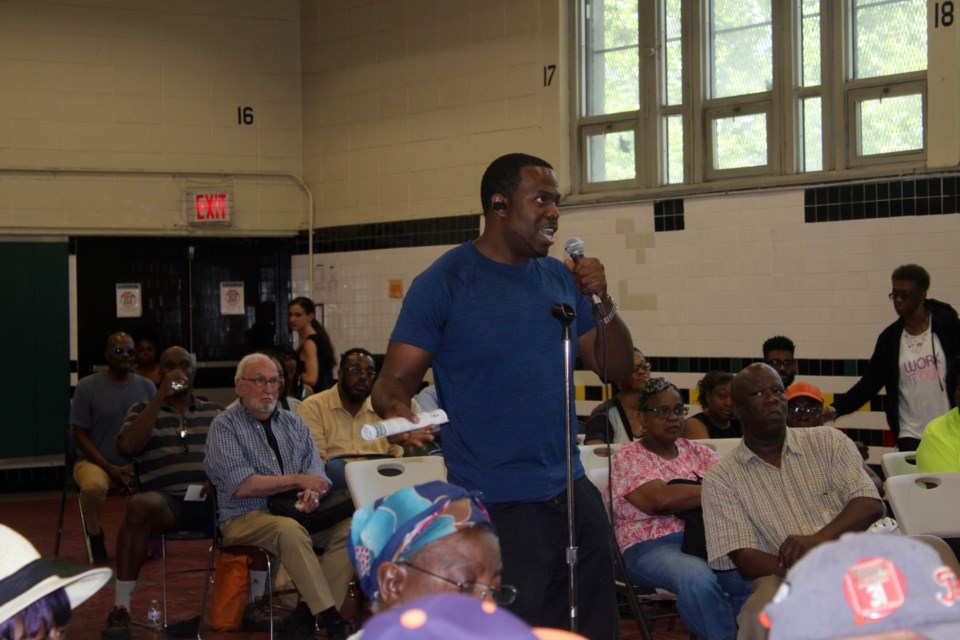The town hall was called by Councilwoman Ampry-Samuels to include NYCHA residents and their feedback in the legal process.

Contributing Reporting by Miranda Levinston
Councilwoman Alicka Ampry-Samuels convened an "emergency" town hall meeting Monday at the Seth Low Community Center in Brownsville, following recent legal actions filed against the New York City Housing Authority for masking major health and safety violations.
Last Monday, the US Attorney's Office released a damning report, accusing NYCHA of lead-paint violations, insufficient heating during winter, vermin infestations and chronic elevator outages and other complaints, following a three-year investigation by the US Department of Housing and Urban Development (HUD) and the Environmental Protection Agency.
In an 80-page consent decree enumerating complaints filed on June 11, the US Attorney's Office proposed hiring a federal monitor to oversee NYCHA under a 10-year plan designed to rectify years of neglect and subterfuge. The decree requires the city pay $1 billion over the next four years and $200 million each year after to fund reparations for NYCHA's deteriorating buildings.
"When I went down to the housing office and asked when the gas was going to be on, you know what they did? They gave me a hotplate and told me to work it out."
The town hall was called by Ampry-Samuels to insure NYCHA residents and their feedback were included in the legal process. But initial talks at the town hall already revealed disparities between what NYCHA residents saw as priorities and what should be litigated on their behalf.
"Try to trickle it down to a regional office when you have an emergency and you call and 24 hours later, no one responds," said Garnette Gibson. Her mother's water main broke on Sunday, flooding her first-floor apartment at Seth Low Houses in Brownsville and leaving a gaping hole in her wall.

Jermel Wilson, a Seth Low tenant for 30-plus years, claimed his apartment has not had gas since May 28. "When I went down to the housing office and asked when the gas was going to be on, you know what they did? They gave me a hotplate and told me to work it out."T
Most pressing among the charges against NYCHA is its general unresponsiveness to tenant requests for exterminators, heating and plumbing services, and reliance on "quick-fix" solutions to meet HUD inspection scores, such as plugging holes with wads of newspapers and shutting off the water to conceal leakages during inspections or when elected officials visit the premises.
Furthermore, it is not uncommon to find one NYCHA maintenance worker assigned for every 250 units, according to HUD Regional Administrator Lynne Patton. Due to funding shortfalls, the agency often fails to backfill vacancies after workers leave, so that one overstretched worker is expected to oversee 500 units.
The Trump-appointed administrator helms HUD's New York and New Jersey offices, and said one of the first things the monitor will be taksed with is overhauling the agency's leadership. "We cannot fix the problem without first addressing the head of the beast," Patton said.
"We have a neurosurgeon running HUD," Patton said. "Nobody can pull the wool over his eyes with respect to the health hazards in NYCHA property."
Also sitting on the panel was Dannie Barber, chair of the City-Wide Council of Presidents, the coordinating body for public-housing tenant leaders. A 45-year resident of the Andrew Jackson Houses in the Bronx, Barber said he lost his mother to poisoning from toxic black mold. "I will not give up my apartment to move to another apartment because [the memories with my mother] are what keep me going," Barber said. "That's what gives me the initiative to fight."
Patton announced that HUD secretary Ben Carson plans to tour NYCHA properties to determine the long-term effects of the health and safety violations, which he was barred from doing while the investigation was ongoing.
"We have a neurosurgeon running HUD," Patton said. "Nobody can pull the wool over his eyes with respect to the health hazards in NYCHA property." She also announced that the federal monitor would host monthly meetings with residents on the third Thursday of every month at HUD's regional Manhattan office at 26 Federal Plaza to solicit their feedback.
"I pledge to you right now that if that meeting does not happen every month, I will step down as regional administrator," she added.

At the back of the room, Samuels had assembled three NYCHA representatives to take complaints from tenants directly, to be included in the consent decree. But just over two hours into the town hall meeting, while a tenant was speaking, the representatives started packing up to leave.
Samuels grabbed a microphone to stall them, as most audience members did not have the chance to approach them while the town hall discussion was ongoing.
Councilmember Mark Gjonaj, who serves alongside Samuels on the public housing committee, urged tenants to get involved with their local resident associations.
"Let me begin this the right way by apologizing to each and everyone of you for the government failure," he said, "for the lies and deception and deceit. Act now so we can act for you."




